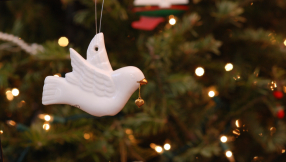
The other day I was involved in some filming where we asked people on the streets to name some of the traditional wedding vows. Many mentioned "for better, for worse", "for richer, for poorer", "in sickness and in health" and of course "til death us do part", but there was one that people tended to forget.
What was it? "To love and to cherish".
"Cherish" – it is a funny, rather old-fashioned word isn't it? You're unlikely to hear it mentioned much outside a wedding service. But it is a key ingredient in a healthy marriage and one we would do well not to forget. So, how do we make sure that we are living out our vow to "cherish" our partner? Here are a few ideas to get you started.
1. Be intentional. To cherish isn't a passive action – it's an active one. It's about nurturing, loving, protecting, caring for and treasuring our partner.
Years ago a couple I know who work in marriage ministry gave my husband and me a little card each. Mine said, "How can I show God's love to my husband today?" And yes, my husband's said the same except "to my wife". We still have those cards. Mine is on my dressing table mirror and David's is by his toothbrush. They are good questions and ones that are at the heart of cherishing each other. What could you do today?
2. Be kind. I don't think you can be unkind and cherish someone at the same time. It can be challenging to be kind when we feel upset, hurt, disappointed or angry with our spouse but if we are determined to cherish them, then we need to try.
Being kind doesn't mean ignoring what is wrong or pretending bad stuff hasn't happened. It does mean putting down our desire to hurt back, get revenge, score points, sulk, attack, criticise or nag. It means choosing our moment to say what we need to say without lashing out or saying words that we'll regret. And it means forgiving and asking for forgiveness when we need to.
One way we can practise this is by being kind about and to our spouse in public, especially in front of children if you have them. How could you show your husband or wife support, encouragement or kindness in public or private today?
3. Choose to love. There'll be days where we might not 'feel' in love with our partner. That is normal. But every day we can choose to love them. We can choose to move towards our wife or husband rather than away from them in the way we act, respond or behave. We can choose to meet their needs and love them even if they aren't reciprocating.
It doesn't take much to cause a downward spiral in a relationship, especially if we tend to look out for our own interests and blame our partner when things go wrong. However, we can also be the catalyst that creates an upward spiral. How? By taking responsibility for our own reactions and behaviour and by loving our partner whether we feel like it or not.
What one action could you take today to show love to your partner in a way that will make them feel loved?
4. Put being an 'us' first. When we get married, we form a 'we' or 'us' and how we behave and respond in that relationship will either help to protect, build and nurture that 'us' or it will hurt, harm and ultimately destroy it.
When things aren't going our way in a relationship it can be tempting to talk in terms or 'you' and 'I'. Normally where 'I' is in the right and 'you' are in the wrong. But thinking and talking in terms of an 'us' can be much more productive.
Why not try it this week? Instead of telling your partner what he or she can do better, why not ask: "How can we improve this situation?"
It is a tiny change but it could make a big difference.
5. Be their number one fan. Most of us like it when we are appreciated, respected, encouraged, known and understood. I expect your spouse is the same. How could you show them that you are their number one fan? Do you need to listen more, spend more time with them, seek to understand them more, take more responsibility, show them more intimacy, encourage them, support them more or do something else?
Researcher Judith Wallerstein did a study into how people define "happy" in their marriage. In her book, The Good Marriage, she explained the result:
"For everyone, happiness in a marriage meant feeling respected and cherished... for a surprising number love grew in the rich soil of marriage, nourished by emotional and physical intimacy, appreciation, and fond memories... all felt that they were central to their partner's world and believed that creating a marriage and a family was the major commitment of their adult life."
And if that isn't a good enough reason to keep on cherishing, then do it because you promised to.
Sarah Abell is the founder of nakedhedgehogs.com and is passionate about helping people to love, live and lead authentically. If you want to find out how authentic your relationships are – you can take a free test on her website.













